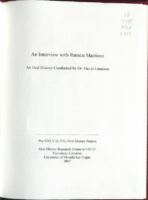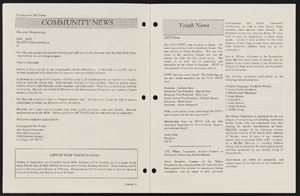Search the Special Collections and Archives Portal
Search Results

Transcript of interview with Janet Garry by Elyse Rozinsky, February 24, 1979
Date
Archival Collection
Description
On February 24, 1979, collector Elyse Rozinsky interviewed file clerk, Janet Garry, (born on November 24th, 1927, in Louisiana) at her home in Bonanza Village Trailer Park in Las Vegas, Nevada. This interview covers the growth of Las Vegas from 1952 to 1979. Janet recalls the early years of the television and the telephone. She also discusses her own personal experience of raising a family in Las Vegas.
Text

Transcript of interview with Tony Grasso by Coleen Seifert, February 29 & March 1, 1980
Date
Archival Collection
Description
On February 29, 1980, Coleen Seifert interviewed Tony Grasso (born 1926 in Brooklyn, New York) about his career in gaming. Grasso first provides details on his background and how he ended up moving to Las Vegas in 1951 before talking about his experience as a dealer in some of the early casinos. He also talks a little about the different roles and games that casino workers deal and how players are invited to visit casinos. The interview concludes with a discussion on gaming unions and Grasso’s future plans. On a date that soon followed the above date, Seifert also interviewed Doug Charles (born 1954 in Brooklyn, New York) about his career in the gaming industry. Charles also talks about his family background, his arrival to Las Vegas in 1957, and the early development of the various gaming properties in Las Vegas. He later goes into detail over some of his experiences as a dealer, his opinions on mob control over gaming, and some of the political and legal issues that have arisen in La
Text

Transcript of interview with Emma Ellsworth by Clark Ellsworth, March 5, 1980
Date
Archival Collection
Description
On March 5, 1980, Clark Ellsworth interviewed his grandmother, Emma Ellsworth (born 1902 in Payson, Utah) about her experiences in Southern Nevada. Ellsworth first talks about growing up in Utah and getting married before moving to Pioche, Nevada during the Great Depression. She also talks about bringing up a family in Las Vegas as well as her and her husband’s work in running Beneficial Life, a life insurance business, in Las Vegas. Ellsworth also talks about the Mormon churches in Las Vegas, the schools her children attended, and the number of grandchildren and great-grandchildren she had at the time.
Text

Interview with Rosemary Lynch, June 8, 2004
Date
Archival Collection
Description
Text

Transcript of interview with Jack W. Zunino by Stefani Evans and Claytee White, August 30, 2016
Date
Archival Collection
Description
Landscape architect Jack W. Zunino is a Fellow of the American Society of Landscape Architects (ASLA) and president of the Society's local chapter. He has designed many of Southern Nevada's iconic landscapes: the Rio Hotel, the M Resort, the Desert Demonstration Gardens, the gardens at Ethel M. Chocolates, the Cactus Avenue overpass, and most notably, the Springs Preserve. He's also a third-generation Nevadan from Elko, grandson of Italian immigrants who met and married in the Silver State and raised their large family in that Nevada mining town. The product of Elko schools, he graduated from the University of Utah in psychology and Utah State University in landscape architecture while earning his tuition as a road construction laborer. In this interview, Zunino tells of his employment with G.C. Wallace Engineering and JMA architects before founding his own landscape architecture firm in 1989. He speaks to the importance of planners and landscape architects on Southern Nevada's conser
Text

Nicole Charlton oral history interview: transcript
Date
Archival Collection
Description
Oral history interview with Nicole Charlton conducted by Barbara Tabach on May 23, 2018 for the Remembering 1 October Oral History Project. In this interview, Charlton discusses her early life in Carlin, Nevada and relocating to Las Vegas, Nevada in 1990. Charlton is the Executive Secretary to the Clark County Coroner John Fudenberg and was among the first from the Coroner's office on the scene of the Route 91 shooting in Las Vegas.
Text
Elaine Newton oral history interview
Identifier
Abstract
Oral history interview with Elaine Newton conducted by Cecilia Winchell, Kristel Peralta, and Vanessa Concepcion on May 19, 2021 for Reflections: The Las Vegas Asian American and Pacific Islander Oral History Project.
Elaine Newton shares her family's history living in Hawaii and Japan, and memories from her childhood growing up with her six siblings in Honolulu. She talks about becoming a flight attendant for Pan American World Airways and how she met her former husband, Wayne Newton, after a stop in Vietnam. Elaine recalls their courtship and marriage as well as what Las Vegas life, fashion, and entertainment were like during the 1980s. She also speaks about racial discrimination and anti-asian violence in the past and present.
Archival Collection

Transcript of interview with Ramon Martinez by Dr. David Emerson, April 24, 2006
Date
Archival Collection
Description
Text

Transcript of interview with Gladys Neville by JoAnn Bingham, June 2, 2004
Date
Description
Text

